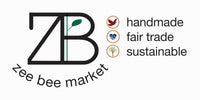Our Producers
 Fair Trade Jedando Modern Handicrafts is a Kenyan organization that works with individual carvers in Machackos, Kenya creating functional products. Carving is a tradition in Kenya with the children learning the craft from their parents. Carved by hand using only rudimentary hand tools, olive wood bowls, salad serving sets, and animal-shaped napkin rings take shape from pieces of olive wood, mahogany, and mpingo, or “African Ebony.” This gorgeous collection comes to us thanks to the work of our supplier, Global Crafts, and this group.
Fair Trade Jedando Modern Handicrafts is a Kenyan organization that works with individual carvers in Machackos, Kenya creating functional products. Carving is a tradition in Kenya with the children learning the craft from their parents. Carved by hand using only rudimentary hand tools, olive wood bowls, salad serving sets, and animal-shaped napkin rings take shape from pieces of olive wood, mahogany, and mpingo, or “African Ebony.” This gorgeous collection comes to us thanks to the work of our supplier, Global Crafts, and this group. An integral part of the organization’s function is to educate the craftspeople on the need for reforestation to enable the products to be available for years to come and offer a sustainable income for generations.
While wood carving provides the major income for many in the Machackos area, other craftspeople earn a living by further enhancing the products including painting the napkin rings and carving discarded animal bone for the handles of salad serving sets. Often the bone is “batiked” by placing wax on the white bone and dipping the bone into dark brown dye.

COMPARTE (Comercializadora de Productos Artesanales Exportables) is a private, non-profit organization that exports fine Chilean handicrafts around the world. Our supplier, Global Crafts, brings these handmade products to the United States.
As members of the World Fair Trade Organization (WFTO), Comparte’s mission is to improve the standard of living for owners and employees of Chilean handicraft workshops, by promoting and exporting various handmade products of the highest quality, while supporting these same artisans through technical and product development assistance programs.
Purchasing COMPARTE products helps improve the living conditions of their artisans by paying fair prices and stimulating justice in the workplace. The artisans often work from their homes. In some cases adult children work alongside their parents while young children attend school.

For over a decade, Maya Traditions has worked with more than 100 Maya women weavers in five established groups in the highlands of Guatemala. Maya Traditions promotes women who practice the art of backstrap weaving –an ancient traditional craft that women can do from their homes while caring for their families- as well as crochet artisans, footloom weavers and other small family artisan businesses.
For a typical Maya woman, weaving is a ritual part of her daily life. After doing family chores before dawn, she unrolls and connects her loom. She sits, strapping the loom around her waist, and weaves 3 or 4 hours until she prepares lunch for her family, then weaves another 3 or more hours until sunset.
Linguistically differentiated by as many as twenty dialects, the Mayans share a common bond through their weaving heritage. Many aspects of Maya Culture are communicated by costume or “traje.” It is a true art form where a woman shows her artistry and level of commitment to cultural identity.
At the heart of Maya Traditions’ efforts is the improvement of quality of life. Many people face poverty and lack basic services. As a member of the Fair Trade Federation, Maya Traditions ensures the artisans are paid a fair price for their products, and has established programs to help artisans with health care and education for their children. Our supplier, Global Crafts, works with this organization and makes their products available to U.S. consumers.
 The artisans of Tecalpulco, Mexico, have long been known for their silver and abalone jewelry. Art Camp, short for Artesanas Campesinas or rural women artisans, is a women-owned cooperative that continues this tradition.
The artisans of Tecalpulco, Mexico, have long been known for their silver and abalone jewelry. Art Camp, short for Artesanas Campesinas or rural women artisans, is a women-owned cooperative that continues this tradition.
The group works hard to introduce new methods, materials, and machinery to face the challenges of the highly competitive jewelry market. Art Camp has survived a collapse in the 1990’s in the marketability of their pieces with the influx of jewelry from other countries to the U.S. market.
These artisans have become business women and understand the importance of customer service, exquisite design and superb quality. Our supplier, Global Crafts, brings to us a wide selection of their unique, handmade jewelry.

